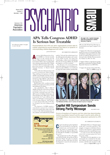I would like to clarify some of the statements in the article “Studies Closing In on Diabetes, Psychiatric Illness Link, “ which appeared in the July 5 issue.
This article discusses the links between diabetes and atypical antipsychotics. In one section this article reports on diabetes alerts issued by Japanese and British regulatory agencies for olanzapine, as well as on a presentation of diabetes adverse reports compiled by a group from the FDA and me. An endocrinologist is then quoted as saying that when “patients and even physicians hear these kinds of reports, they just freak out” and that “only solid research will help answer the questions.”
I would like to respond to these quotes because they may serve to cast doubt in the readers’ minds about the actions taken by regulatory agencies charged with public protection, as well as our research.
Society as a whole benefits from pharmaceutical drug discovery and refinement of older therapies with newer agents. Every drug that has beneficial effects also has side effects. By many accounts, atypical antipsychotic drugs are breakthrough treatments that have improved the lives of thousands of patients. So the real issue here is not about denying the benefits of these drugs but about understanding their risks with appropriate use to prevent unnecessary harm. The purpose of postmarketing surveillance reports and regulatory label changes is to alert consumers and professionals to adverse effect signals that have become more apparent since the drug was marketed and taken by several tens of thousands of real-world patients.
If one waited until causality was proven before publishing an adverse event report or issuing a public alert, then essentially we would have no adverse effects listed on any drug label at the time of its initial approval. Causality is impossible to prove in many situations for a variety of reasons, including the nature of registration trials and lack of long-term controlled trials in real-world samples.
Therefore, it is vital for all of us to treat regulatory actions and postmarketing adverse event reports seriously. When a critical mass of certain adverse events or deaths emerges, the burden lies on the manufacturer to prove a drug does not cause this problem. The burden does not lie with patients, clinicians, or regulatory agencies to prove a drug is unsafe. One prospective naturalistic study has suggested that approximately 36 percent of patients taking clozapine over a five-year period may be diagnosed with diabetes (Am J Psychiatry, 2000; 157: 975-981), a rate of about 7 percent a year. This rate is several-fold higher than that reported by other studies with shorter drug-exposure periods. Currently, no one knows what the true rates of treatment-emergent diabetes are with any atypical antipsychotic, and causality is not proven. However, if a drug with a million patient-years of exposure were to precipitate diabetes at a rate of 3 percent to 7 percent a year, then there would be an estimated 30,000-70,000 cases of treatment-emergent diabetes mellitus. Because atypical antipsychotics will be taken by millions of individuals for decades, large pragmatic trials conducted by neutral parties to address causality and relative risk differences are essential.
In the interim, I urge readers to educate themselves fully by relying on neutral sources of information and monitor their patients’ well-being.
(Disclosure: I have received research grants and consulting honoraria from Lilly, Janssen, and the manufacturers of all atypical antipsychotics and have been a member of Lilly’s Zyprexa Diabetes Advisory panel.)
